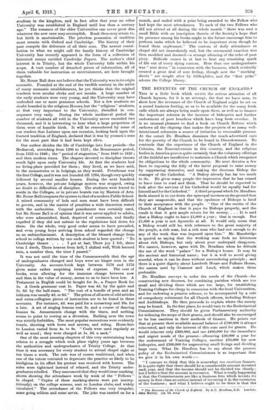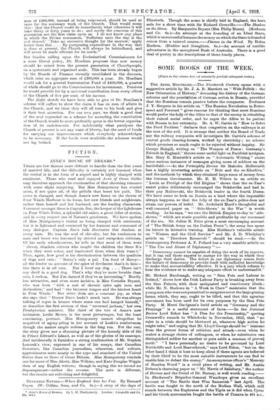THE REVENUES OF THE CHURCH OF ENGLAND.* Tars is a
little book which merits the serious attention of all Church laymen, for it is an attempt, the first we have seen, to show how the revenues of the Church of England might be set on a sound business footing, so as to be available for the many fresh calls which are always being made upon them, as well as to finance the important reforms in the increase of bishoprics and further endowment of poor benefices which have long been overdue. It is an unusual pleasure to find a book on Church Reform which eschews all the claptrap that makes the projects of so many well- intentioned reformers a source of irritation to reasonable persons. At the outset Dr. Headlam dismisses the much-advertised cure for the poverty of the Church to be found in Disendowment. He contends that the experience of the Church of England in the Colonies, the Nonconformists in this country, and the religious bodies in America proves quite certainly that the voluntary offerings of the faithful are insufficient to maintain a Church which recognizes its obligations to the whole community. He next devotee a few lines to exposing the folly of the latest proposal to raise money by suppressing deaneries, and making the diocesan Bishop the manager of the Cathedral. "A Bishop already has far too much to do. He gives many people the impression that he has ceased to have time to read and think. That he should be expected to look after the services of his Cathedral would be equally bad for himself and for the Cathedral." A third proposal which Dr. Headl am finds absurd is to cut down the episcopal incomes on the ground that they are unapostolic, and that the opulence of Bishops is fatal to their acceptance with the people. "One of the merits of the Church of England is that it pays its Bishops properly, and the result is that it gets ample return for its money. . . . It is said that a Bishop ought to have £1,000 a year ; that is enough. But £1,000 a year is not Apostolic at all. It would only mean that a Bishop would still be, with reference to the great majority of the people, a rich man, but a rich man who had not enough to do any of the work that was imposed upon him." Mr. Mansbridge is quoted as saying that the working man feels no bitterness about rich Bishops, but only about poor underpaid clergymen. We cannot, however, agree with Dr. Headlam when he defends the use of the word " palace " for a Bishop's house. It may be the ancient and historical name ; but it is well to avoid giving scandal, when it can be done without surrendering principle ; and there is a quiet dignity about Lambeth House and Fulham House, the names used by Cranmer and Laud, which makes them preferable.
Dr. Headlam surveys in order the needs of the Church—for constructing new dioceses, for combining parishes which are too small and dividing those which are too large, for establishing Training Colleges for clergy in connexion with the local Universities, and for endowing a pension scheme, to be accompanied by a rule of compulsory retirement for all Church officers, including Bishops and Archbishops. He then proceeds to explain where the money may be found. In the first place, he would turn to the Ecclesiastical Commissioners. They should be given Parliamentary authority for widening the scope of their grants, and should also be encouraged to be less cautious in their methods of finance. Ho points out that at present their available annual balance of £700,000 is always reinvested, and only the interest of this sum used for grants. He would reinvest only £300,000, and use £400,000 for the immediate and urgent needs of the present—allocating £50,000 a year for the endowment of Training Colleges, another £50,000 for new bishoprics, and £300,000 for augmenting small livings and dividing large ones. What Dr. Headlam has to say about the present policy of the Ecclesiastical Commissioners is so important that we give it in his own words :— "I venture to think that this is somewhat too cautious finance. It is quite right that there should be a considerable amount invested each year, and that the income should not be divided too closely but I believe that the amount is excessive. What is really happening is that the Commissioners are like a business firm which invests its money in first-class securities instead of investing it in the extension of the business ; and what I believe ought to be done is that the • The Revenues of the Church of England. By A. C. Ilendlam, D.D. London:John Murray. [U. 64. rtet.l' • . . . . _ sum of £400,000, instead of being reinvested, should be used at once for the necessary work of the Church. That would mean this : that the Church could do immediately what otherwise it will take thirty or forty years to do ; and surely the concerns of this generation are the first claim upon us. I do not know any place in which the Divine commands, 'Sufficient unto the day is the evil thereof,' 'Take no excessive thought for the morrow,' apply better than this. . . . By postponing expenditure in the way that is done at present, the Church will always be behindhand, and will never be made efficient for its needs."
But besides calling upon the Ecclesiastical Commissioners for a more liberal policy, Dr. Headlam proposes that new money should be raised from the present generation of Churchpeople, on a systematic and organized scale. This has been already begun by the Boards of Finance recently established in the dioceses, which raise an aggregate sum of £300,000 a year. Dr. Headlam would ask for a general Sustentation Fund of £400,000, a quarter of which should go to the Commissioners for investment. Pensions he would provide for by a universal contribution from every officer of the Church of five per cent, of his income.
The slight sketch we have been able to give of Dr. Headlam's scheme will suffice to show the claim it has on men of affairs in the Church, and we trust they will all turn to his book and give it their best attention. For our own part, we think a good deal of the zeal expended on a scheme for amending the constitution of the Church would be more profitably spent in. the better organiza- tion of its endowments. For indubitably what paralyses the Church at present is not any want of liberty, but the need of funds for carrying out improvements which everybody acknowledges to be necessary. If the funds were available, the schemes would not lag behind.



























 Previous page
Previous page